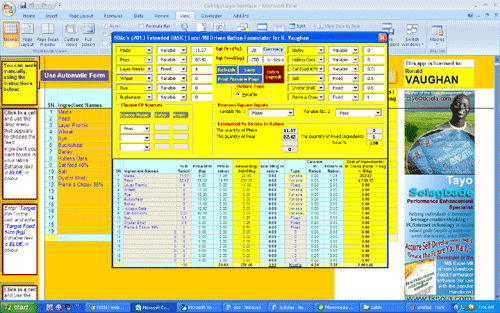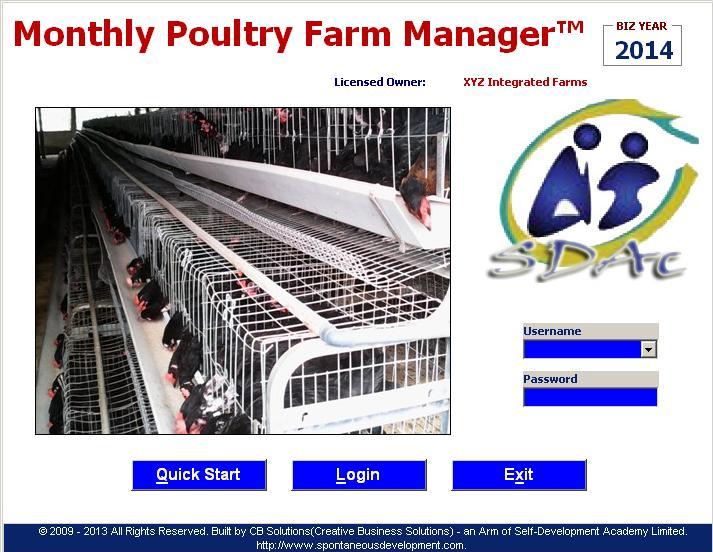
Tayo Solagbade’s
Performance Improvement IDEAS
(PI Squared) Newsletter
Monday 31st October 2016

NB: This PI Squared newsletter will be published weekly, on Mondays, in place of the Speaking/Web Marketing IDEAS newsletter, starting from today – 15th February 2016. I’m reinventing my Monday newsletter content and theme, to accommodate my vision of serving the growing audience of serious minded individuals and organizations reaching out to me, with information, education. news and research findings designed to help them do what they do better.
************
    
PII 038: To Succeed, Today’s Agricultural Extension Professionals Need Entrepreneurship and Spreadsheet Automation Skills
For success in this century and beyond, African societies hoping to profit from Agriculture MUST first of all accept the reality that developing Agriculture is simply NO longer enough. Deliberate and focused effort must instead be persistently applied to developing AGRIBUSINESS.
At the risk of stating the obvious, there is a MASSIVE difference between both concepts.
Here’s my way of illustrating the difference…
I like to think of “Agriculture” as: Farming the Old Way
This has to do with engagement in the activity of farming, with no conscious attention being given to whether or not that activity translates into – significant and sustainable – profit making, financially, and otherwise, for the practitioners.
There was a time when doing “Agriculture” the old way, even here in Africa, was not an unsafe way of life. Back then, things were not as complex and erratic as they are today. Pries of inputs were more stable and affordable. Ready markets existed for most farm produce, both locally and internationally. Most importantly, majority of the population in most African societies were still comfortable being openly engaged in agriculture/farming as a vocation.
Indeed, back then in Nigeria, schools had anthems that kids were taught to recite, which emphasized the importance of engaging in farming. One such anthem, in Yoruba, read in part as follows:
Iwe kiko lai si oko, at ada (Academic study without the hoe and cutlass)
Ko ipe o. Ko ipe o. (Is not complete. Is not complete.)
Ise agbe ni ise ile wa, Eni ko sise, a ma ja le (Farming is the work of our fatherland. Whoever does not work, will steal)
In the past 20 years of my life, I have NOT heard the above anthem sung in ANY school. During my time in school, we never got asked to sing it, but we heard adults who had left school before us recall the heady days when they did just that as they attended school.
Try getting today’s Nigerian youths at ANY level of schooling to sing that song, and I’ll be surprised if they show any enthusiasm.
Even their teachers will balk at the suggestion. Hey. Try it. Go out there and ask school kids if they’ll sing it in public – or ask school teachers if they’ll ask their learners to sing it.
Go a step further and ask the teachers to actually put what the anthem preaches into practice by having learners adopt physical farm work as part of their normal school curriculum. Not the fancy stuff they do in special uniforms that rarely get dirty – but the one in which they are made to really do the deed!
Chances are good that you’ll get complaints not just from the kids, but also their parents and the teachers themselves.
Why?
Well, that’s because a lot has changed in the value system upheld in the society today, compared to what obtained in the past, when that anthem reigned in school.
Following the economic boom that resulted from the discovery of oil in Nigeria, and general industrial development, white collar jobs became the vogue, mainly because they delivered heftier financial rewards in a shorter time period compared to most farm businesses and with much less physical exertion. It made common sense, for most people to follow the money. So the rural to urban migration happened, as it did in other societies.
The only problem was that in Nigeria, even though who did not have the training or competence to take advantage of the city jobs, also migrated. This latter group, were often those well equipped or gifted with the know-how to continue with farming. As a result, agriculture got neglected.
And I like to think of “Agribusiness” as: Farming the New Way
In other societies, especially in the developed world, rural urban migration also happened, with the advent of industrial development.
However, they were proactive enough to create a model that enables those with farming know-how to go beyond practicing just agriculture, to doing agribusiness.
It is instructive to note here that they’ve been doing this for decades: so it’s not really a new way in the true sense of it – but to the extent that we in Africa have yet to make it a way of life like they have, it remains relatively new.
The ability to do agribusiness enabled those not willing to migrate to the city, to continue farming because they were able to reap returns that made staying in that vocation worthwhile in the long term, even when compared to potential monetary rewards to be had from getting white collar jobs.
The best part was that those who practiced agribusiness got to be their own bosses, and therefore retained relatively more freedom over their personal time, than did those who chose to take up paid employment in the city.
It is for this reason, that one finds many farm business enterprises in places like Europe and America being passed down for 2,3, 4 and more generations – feeding, clothing, schooling and securing the financial futures of the offspring of their founders.
In contrast, out here, most enterprises, no matter how large, often fail and die out within a matter of years after the founder has passed on.
The case for Extension Professionals With Entrepreneurship and Spreadsheet Automation Skills
If Nigeria/Africa is to reap the long term rewards of farming, those who engage in it MUST be able to not just turn out sustainable profits, but also setup systems to keep those profit making farms going long after they pass on!
This is why I argue that a new generation or breed of Extension professionals is needed in any society that wishes to succeed in making farming a reliable means of long term employment and income generation.
Traditional extension experts are often people who take up employment with government agencies or NGOs to support farm businesses in various areas.
The problem I have identified with this approach is that these people often approach their jobs with an employee mindset. Quite often they simply go through the motions of doing whatever is required of them as spelt out in their job descriptions or briefs.
Given the unique challenges found in the typical socio-economic environment of Nigeria/Africa, that kind of disposition generally means there will be little incentive on the extension personnel’s part to go the extra mile to do anything.
Yet, quite often, the key to succeeding in providing support to farm businesses will be the ability to do more than is required as the unique situations that occur on demand.
Entrepreneurial ability can be learned. A key aspect has to do with being able to visualize, and then take action with persistence, till a set goal is achieved.
An Entrepreneurial Extension Professional will be able to see beyond what EACH farm business owner s/he serves sees i.e. the big picture of where the business can go, what it can do etc.
S/he will be able to narrow down to the unique strengths that can be developed and weaknesses that need to be trimmed down, so as to ensure the longevity of the enterprise. Using these insights the extension professional will then act as a catalyst guiding the farm business owner to take the right steps to grow his/her brand over time, beyond the level of traditional farm operations.
In order to play the above role effectively and efficiently, the extension professional will find custom spreadsheet automation know-how to be an invaluable skill to possess.
This is because running an agribusiness enterprise profitably will depend greatly on establishing a firm ability to accurately and reliably carry out routine farm operations data recording, analysis and report generation for timely decision making.
Using spreadsheet automation, s/he will be able to help even PC-novice farm CEOs setup systems to reliably carryout data handling, trending and analysis that help the owner better understand the farm process’ potential, so as to inform more accurate planning.
Most importantly, however, a extension professional with this mix of skills will be able to help farm CEOs eventually see the bigger picture s/he is seeing, so they can then jointly work towards building additional streams of income beyond those from direct sales of farm products e.g. farm products processing, passive income streams from monetization of farm CEOs expertise in form of book sales, training, consultancy, etc.
I say this from over 10 years of providing multidisciplinary extension-type support for farm CEOs within and outside Africa, using the web, and in person. These people go through a lot, and are constantly in need of advisory, as well as resource support.
They come to me via phone, email, Skype, Whatsapp, Facebook and even Twitter, demanding, sometimes pleading for help of all kinds. Sadly, since I am NOT a charity, I find myself unable to offer most of them the support they need without requiring payment.
This is why I believe the state needs extension professional with my mix of abilities, to serve its farmers, if they are to excel (Hint: I hold a B.Sc degree in Agricultural Extension Services from Nigeria’s University of Ibadan).
Below, and on other pages of this website, I feature products I create and sell to Farm CEOs using my spreadsheet automation skills. There is demand from them for more, but I have found that most would benefit more from having in-house support to do it themselves, or the assistance of extension personnel with the skill.
So, How Do You Equip Your Extension Professionals With Entrepreneurship and Spreadsheet Automation Skills?
Sadly, space precludes my covering that in THIS piece.
But it would be my pleasure to formally elaborate on how to go about it, in a paper I’ve prepared on that subject. Click here to invite me.

Excel-VB Driven Ration Formulator

1. Click here to learn more about this app – watch demo videos etc
2. Click here to watch a 4 part video in which I demonstrate how to use this app to formulate rations using real life data sent to me by an Algerian PhD student.
Click here to contact me about purchasing this product.
EXCEL-VB DRIVEN POULTRY LAYER FARM MANAGER SOFTWARE
Click here to download a detailed PDF user guide and watch 15 screen shot user guide tutorials of the Monthly Poultry Farm Manager that I now offer Farm CEOs.

Click here to contact me about purchasing this product.
SDN Blog™
New posts from last week*
Monday:
[Tuesday]:
[Wednesday]:
[Thursday]:
[Friday]:
N/A
[Saturday]:
[Sunday]:
|






